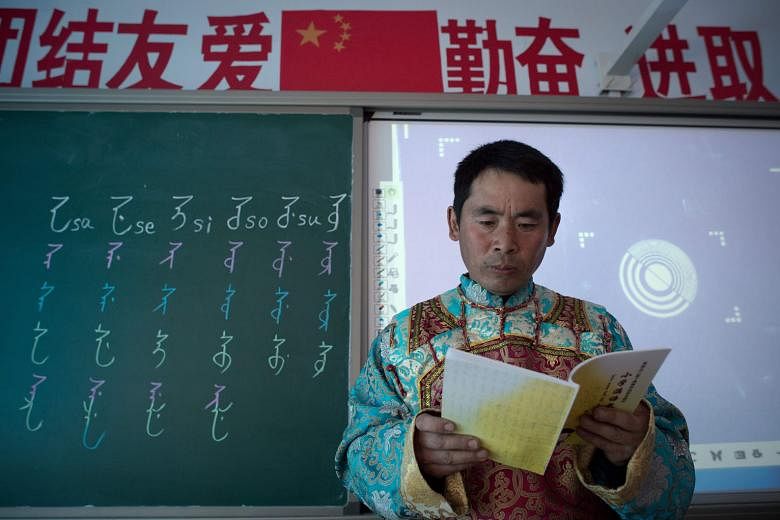SANJIAZI (China) • It was the language of China's last imperial dynasty that ruled a vast kingdom for nearly three centuries but Mr Ji Jinlu, 71, is among only a handful of native Manchu speakers left.
The Manchus, who were traders and farmers from what is today the border region between China and the Korean peninsula, took advantage of a crumbling Ming state and swept south in the 1600s to establish their own Qing Dynasty.
Manchu became the court language and its angular, alphabetic script was used in millions of documents.
Now, after centuries of decline followed by decades of repression, the septuagenarian Mr Ji is the youngest of some nine speakers left in Sanjiazi village - one of only two places in China where they can be found.
"We mostly speak Chinese these days - otherwise, young people don't understand," said Mr Ji, in his sparsely furnished hut next to some cornfields, before launching into a self-composed Manchu lullaby.
-
LANGUAGES IN DANGER
-
A look at Unesco's classification system on the degree of endangerment for languages.
VULNERABLE: Most children speak the language, but it may be restricted to certain domains, for instance, only at home.
DEFINITELY ENDANGERED: Children no longer learn the language as a mother tongue in the home.
SEVERELY ENDANGERED: Language is spoken by grandparents and older generations. While the parents' generation may understand it, they do not speak it to the children or among themselves.
CRITICALLY ENDANGERED: The youngest speakers are grandparents and older, and they speak the language partially and infrequently.
EXTINCT: There are no speakers left.
SOURCE: http://www.unesco.org/ languages-atlas/
Manchu is classed as "critically endangered" by the United Nations cultural organisation Unesco, which says that half of the more than 6,000 languages spoken worldwide are threatened with extinction, a major loss of knowledge and diversity for humanity.
But there are more schemes in the pipeline to save the Manchu language, as ethnic consciousness grows among the 10 million-strong minority group.
The sign for the village primary school in Sanjiazi, in the north-eastern province of Heilongjiang, is in Manchu's vertical script, with posters in the language written by pupils lining its corridors.
Staring intently at an electronic display, students learn the Manchu alphabet, and the words for "umbrella" and "cow". But the instruction is in Chinese, the everyday language of school life, as are the bellowed lyrics of a song titled We Are The Good Manchu Children.
Teacher Shi Junguang, who painstakingly learnt Manchu from older residents and native speakers before they died, is dressed in a red and turquoise robe with gold sleeves, which is reminiscent of the Manchus' traditional apparel.
Mr Shi said today, the Manchus "don't really have any special ethnic characteristics in food or dress".
"The main thing we have here is the language," he said.
Under the Qing - or "pure" - dynasty, China saw massive territorial expansion before it entered a period of decline in the 19th century, assailed by corruption and pressure from European and other foreign powers. Discrimination against non-Manchu Chinese people became rife and helped fuel a series of rebellions that finally saw the dynasty overthrown in 1911.
Republican leader Sun Yat Sen, who played a key role in the revolution that overthrew the Manchus, said: "To restore the Chinese nation, we must drive the barbarian Manchus back to the Changbai mountains." The mountains were their ancestral homeland.
Many remaining Manchus hid their language, a trend that intensified under Communist leader Mao Zedong, who launched campaigns to eradicate foreign and traditional culture.
At the height of Maoism, "no one spoke the language", said Mr Ji.
Political controls became relaxed in the 1980s after Mao's death.
Several universities today offer Manchu courses, and enthusiasts in major cities have formed clubs to study the language and culture.
China has launched a massive project to translate Qing documents into modern Chinese, an effort aimed at promoting a view of the dynasty as essentially Chinese.
But the language is also being studied by academics in countries like Japan and the United States.
Harvard professor Mark Eliot said teaching Manchu was considered less of a threat by the ruling party than Tibetan or the language of the mainly Muslim Uighur minority, as China's north-eastern provinces are "so firmly welded" into the country that accusations of separatism were implausible.
"That makes Manchu a little bit safer," he said.
AGENCE FRANCE-PRESSE

